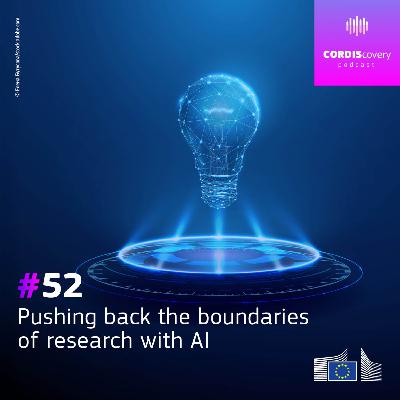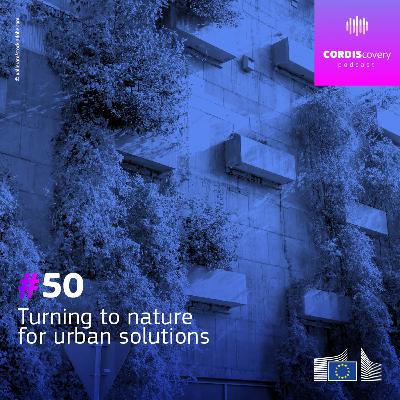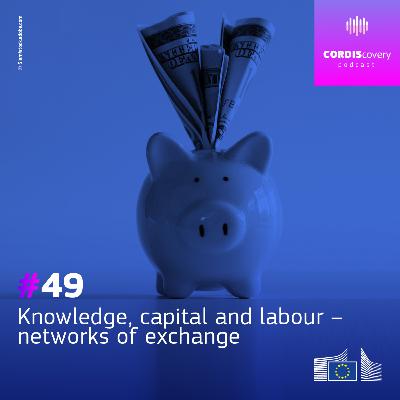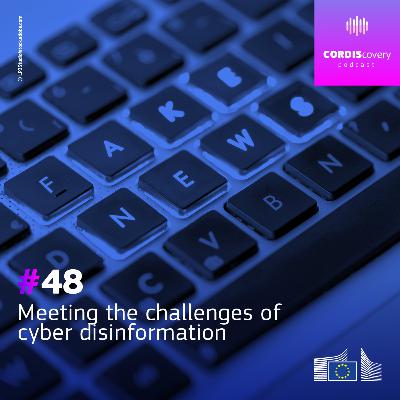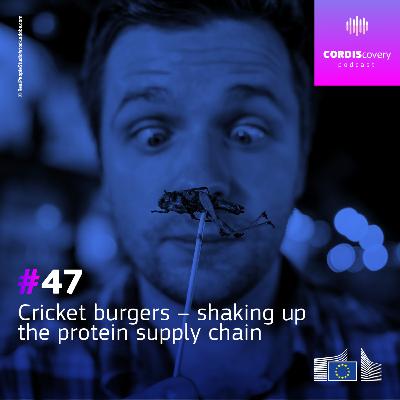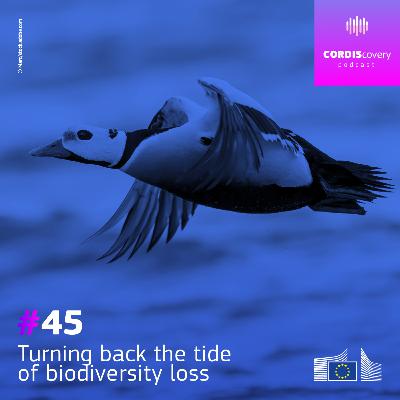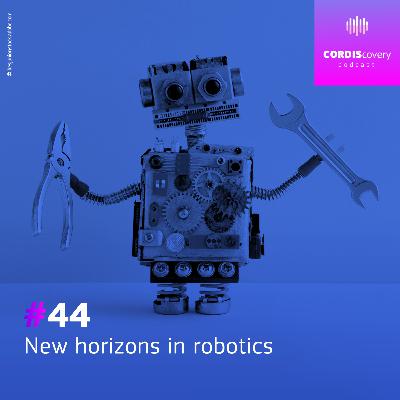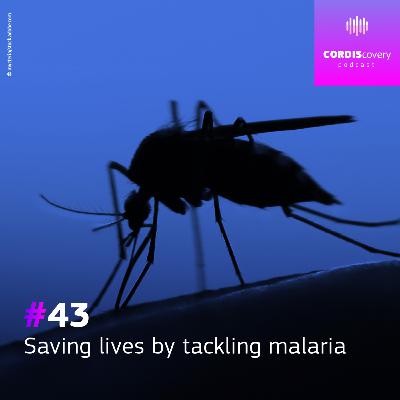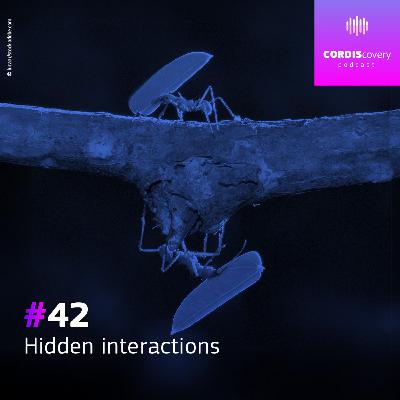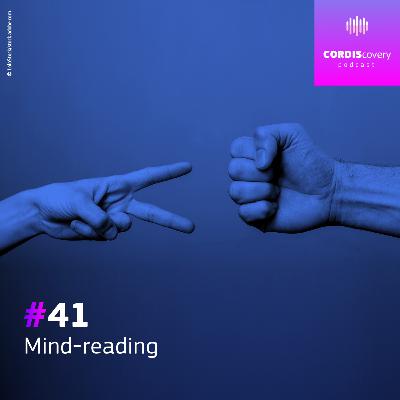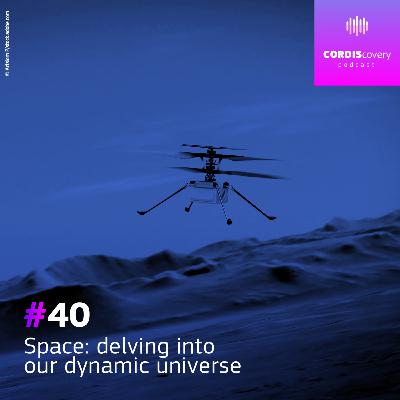Discover CORDIScovery – unearthing the hottest topics in EU science, research and innovation
CORDIScovery – unearthing the hottest topics in EU science, research and innovation

CORDIScovery – unearthing the hottest topics in EU science, research and innovation
Author: CORDIScovery
Subscribed: 10Played: 161Subscribe
Share
© CORDIScovery
Description
CORDIScovery is a monthly podcast featuring a panel discussion between guests at the forefront of their scientific fields. From threats to biodiversity to the future of space exploration, if you want to hear how the EU’s cutting-edge research is taking on the key issues challenging us today, then be sure to download and listen to what Europe’s leading scientists have to say. CORDIScovery is produced by CORDIS, whose mission is to share the results of the very best of EU-funded research.
51 Episodes
Reverse
Artificial intelligence: are we heading for a dystopic future, or one in which a labour force is relieved from menial tasks?Machine learning is second-guessing us; is this making our lives easier, or is it intrusive? Corporates are hoovering up content to train large language models in ways that are hard for users to control. But there is no doubt that AI, and related tools, are pushing back the boundaries of research.AI can be framed as technology that impacts us negatively, but today’s guests are achieving results and gaining knowledge that would not have been possible without it.John Kelleher is the director of the ADAPT ResearchIreland Centre for AI-Driven Digital Content Technology andprofessor of Computer Science at Trinity College, Dublin. Jane Ohlmeyer is professor of Modern History at Trinity College Dublin, chair of the Irish Research Council, andan expert on New British and Atlantic Histories. She is applying AI to the recovery of the lived experiences of ‘ordinary’, non-elite women in early modern Ireland. Béla Mihalik is a senior developer at Ideas Science,in Hungary. He specialises in the application of AI and deep learning to develop novel tools that can rapidly screen potential biothreats in the form of pathogens and bacteria.
In his novel Animal Farm, Orwell’s character claims: “Four legsgood, two legs bad.” Would the tyrannosaurs agree? Or did bipedalism give them an evolutionary advantage? Examining how birds, crocodiles and other animals move can tell us about the biomechanics of extinct animals, and the impact that had on their survival. Beyond moving, the way in which dinosaurs interacted with their environment shaped the world around them. The co-evolution of species and ecology over deep time offers insights about modern ecosystems, so what can welearn from a long-vanished world?John Hutchinson is a fellow of the Royal Society and a leaderin the field of evolutionary biomechanics. Davide Foffa is a postdoctoral researcher in palaeobiology at the University of Birmingham. He uses palaeontological data to understand the origins and evolution of ecosystemsthrough major evolutionary events such as mass extinctions.Sara Varela is a palaeoecologist at the faculty of biology at the University of Vigo, in Spain. She considers the relationship between climate and life on Earth, and how past climate changes affected the geographic ranges and evolutionary pathways of species.For more info, visit: https://link.europa.eu/ckRfxR
About three quarters of the population in the EU are urbanites. Are you living in an inclusive area, with parks and public spaces you and the other local residents have had a say in designing? Or is that something that seems out of your reach? Nature-based solutions, or NBSs, co-creation, living labs – what do these terms mean and why are they important? Let’s turn to our three guests today, all of whom benefited from research and innovation funding: Darko Ferčej is head of the EU project Unit within the Slovenian non-profit institute, E-zavod. His area of interest is transforming policy theories into practical changes that benefit people’s lives in urban environments. Laura Fregolent is professor of Urban Planning at the University of Venice in Italy. Over the years she has investigated the processes of urban transformation and sprawl, and the social impact of housing dynamics. Gonçalo Canto Moniz is a professor of Architecture and researcher at the Centre for Social Studies at the University of Coimbra, in Portugal. He is fascinated by the way co-creation of nature-based solutions within our cities can promote more inclusive urban neighbourhoods. For more info, visit: https://link.europa.eu/mN9Y8B
From early economic activity along the Silk Road to modern-day Brazil, what are the unexpected impacts of the movement of labour and the flow of capital? Taking one market as an example, how can pharma be made more equitable? As the words ‘tariffs’, ‘economic growth’, ‘global trade’ and ‘sanctions’ fly around us, the economy and how markets are interlinked is something we are all growing more aware of.Listen on as our three guests unravel some of the complexities: Sitta von Reden is professor of Ancient History at the University of Freiburg, Germany. Paula Bustos is research professor at Pompeu Fabra University, and Susi Geiger is professor of Markets, Organisations and Society at the College of Business, University College Dublin.For more info, visit: https://link.europa.eu/4pGxkn
Remember when you could wander around the internet, fairly confident that what you were looking at was probably reliable? Over the years it seems that information is becoming less and less trustworthy and with deepfakes and biased algorithms it’s starting to feel like the disinformation might be around every corner.Here to help us navigate the maze are three researchers, who have all received support from EU science funding: Owen Conlan, is a fellow of Trinity College, Dublin, and professor in the School of Computer Science and Statistics.He is also co-director of the Trinity Centre for Digital Humanities. Owen is very interested in user control over personalised AI-driven systems.Joana Gonçalves-Sá is a researcher both at the Nova Laboratory for Computer Science and Informatics and in the Laboratory of Instrumentation and Experimental Particle Physics, Lisbon, where she leads the Social Physics and Complexity research group. Her focus in on human and algorithmic biases, using fake news as a model system.Marián Šimko is an expert researcher at the Kempelen Institute of Intelligent Technologies in Slovakia. Marián focuses on natural language processing, information extraction, low-resource language processing and the interpretability of neural models.For more info, visit: https://link.europa.eu/DVCrYM
Melted cheese over a burger – is your stomach rumbling? How about making that cheese from plant protein and the burger from insects? We need to develop ways to produce more existing sources of protein more efficiently. Animal-based protein has an important role as part of a sustainable diet and as a contributor to food security. But now is the timefor alternative sources of complementary protein for direct human consumption, and animal feed, to increase their market share. In this episode we are going to be looking at how to increase the production and market uptake of complementary proteins, with:Emanuele Zannini who has a PhD in Applied Biomolecular Science and is now a senior researcher coordinator at the School of Food and Nutritional Sciences, University College Cork. Tuen Veldkamp, a senior researcher in Animal Nutrition at Wageningen University and Research (WUR) and who is interested in testing and demonstrating innovative rearing methods to help the European insect supply chain become commercially viable.Erlend Sild the founder of the deep-tech company, BugBox, who has developed an industrial and scalable technology forsustainable protein production from crickets, providing competitive production costs and increasing efficiency using AI. For more info, visit: https://link.europa.eu/kqcc9j
What can surface-enhanced Raman spectroscopy tell us about the presence of novichok? How can we improve our understanding of how asteroids respond to the tactics we may need to deploy for planetary defence? And as incidences of wildfires grow, how can Europe’s response be more effective? Listen on to hear the answers to these and many other key questions. Joining us for this episode are: Patrick Michel, a director of research at the French National Centre for Scientific Research in the Côte d’Azur Observatory in Nice. He is involved in space missions to asteroids, for both science and planetary defence purposes and is the principal investigator of the European Space Agency’s Hera mission, which contributes to the first asteroid deflection test through NASA’s DART mission. Emilio Chuvieco, professor of Geography and director of the Environmental Ethics chair at the University of Alcalá, Spain, and his main interest is the use of Earth Observation data to monitor environmental problems, particularly forest fires. Tomas Rindzevicius, a senior researcher in the Department of Health Technology, Drug Delivery and Sensing, at the Technical University of Denmark, who focuses on the application of nanomaterials for sensing applications to detect trace amounts of explosives, toxic industrial chemicals and chemical warfare agents. For more info, visit: https://link.europa.eu/XDXNCK
What can we do to save species under threat from climate change and human encroachment? From the oceans to the forests, today we look at how vital evidence is to preserving biodiversity, a key barometer of the planet’s health. Biodiversity is under threat, but it is not all grim news: science-based conservation can step in and halt a decline, as shown in a paper published recently in the journal ‘Science’, which did a meta-analysis of 186 studies comparing changes in biodiversity over time. Today we’ll journey through rainforests, air and sea to hear about the latest research funded by the EU, that is gathering the data we need to make conservation effective, with Claire Fortunel who is based at the French National Research Institute for Sustainable Development; Alison Cleary, a molecular ecologist at the British Antarctic Survey, and Ada Álvarez-Manzaneda, a fellow at the Department of Ecology at the University of Granada, in Spain. For more info, visit: https://link.europa.eu/vDTrvc
Assistive tech, preventing injury at work and biomimetics feeding into the design of future robotic systems – listen on to find out more about the robots of the future.Robotics is a swiftly changing field: Cheaper hardware is making research more accessible, and thanks to advances in AI, the focus is now shifting from feats of physical dexterity achieved by expensive robots, to building ‘general-purpose robot brains’ in the form of neural networks.Talking these ideas over are Mac MacLachlan, professor of Psychology and Social Inclusion, and co-director of the Assisting Living & Learning Institute at Maynooth University, in Ireland.Arash Ajoudani the director of the Human-Robot Interfaces and Interaction laboratory at the Italian Institute of Technology. And Tim Landgraf, based at the Dahlem Center for Machine Learning and Robotics at the Free University of Berlin.For more info, visit: https://link.europa.eu/rGvJfY
Why is it so hard to find a vaccine that works well against placental malaria? Ever thought about the challenges of irradiating 300 mosquitoes a second! And how do the dynamics of replication play out in our bodies?Malaria is described by the World Health Organization as ‘perpetuating a vicious cycle of inequity’. Listen on to see how EU scientists are working to understand and mitigate the disease.Catherine Merrick is professor of Parasitology in the Pathology Department at Cambridge University. She studies the human malaria parasite, aiming to improve our understanding of the fundamental biology of the parasite, and the impact of this biology on virulence.Lars Hviid is professor in the Department of Immunology and Microbiology, at the University of Copenhagen. His work has improved our understanding of how people gradually acquire protection from malaria, and furthered the development of vaccines against this deadly parasite.Hanan Lepek is the founder and CEO of Senecio Robotics. He works at the interface of biology and mechanical and software engineering, to create and deploy sterile mosquitoes on a large scale to reduce local mosquito populations. For more info, visit: https://link.europa.eu/Kfm4fW
Leafcutter ants assiduously farming fungus, bumblebees picking up tiny amounts of electricity given off by flowers – all part of an invisible tapestry of interaction that is unfolding all around us. This episode celebrates the intricacy of our natural world. Did you know that when antelopes browse on an acacia’s leaves, the tree will emit ethylene which acts as an alarm signal to other acacias nearby? The gas can spread 45 metres. Within half an hour, the trees that pick up the signal flush their leaves with very bitter tannins, to make them less palatable to the antelopes. In high concentrations, the tannins can even be fatal.Intrigued? Listen on! Sharing their discoveries of these complex and subtle interactions are: Daniel Robert, professor of Bionanoscience at the School of Biological Sciences at the University of Bristol in the United Kingdom, who is investigating how insects interact with the world around them using tiny charges of static electricity.Ted Turlings is based at the University of Neuchâtel in Switzerland where is a professor of Chemical Ecology. By unravelling how plants defend themselves against insect attacks, Turlings’ team hopes to create novel, sustainable methods of pest control.Associate professor of Ecology and Evolution at the University of Copenhagen in Denmark, Jonathan Shik, is particularly interested in leafcutter ants and their sophisticated farming of their fungus gardens.For more info, visit: https://link.europa.eu/YnqCXB
When you play paper rock scissors, do you try and second-guess your opponent’s next move? This episode looks at mind-reading, and we also have some baby baboons! It’s a great time to be a neuroscientist: Computational modelling, multimodal neuroimaging and novel brain stimulation methods are producing fascinating new data. This episode looks at some of the latest research that has made the most of such techniques to reveal how our minds work, and how our brains are structured. Christian Ruff is a professor of Neuroeconomics and Decision Neuroscience at the University of Zurich; he uncovers how the brain navigates complex social and moral situations. A professor of Developmental Cognitive Neuroscience at the University of Copenhagen, Victoria Southgate, studies infant social cognition, and is particularly interested in how infants think about the self and the other. Adrien Meguerditchian is a comparative psychologist at the Centre of Research in Psychology and Neuroscience, at the National Centre for Scientific Research, in France. He has worked with wild chimps in Senegal and on brain MRI studies in the United States as part of his goal to understand how communication shapes the brain. For more info, visit: https://europa.eu/!jFbKWc
Could the swirling dust storms on Mars impact on space exploration? Could a theory on the origins of life on Earth reveal if there has ever been life on Mars, and how do you get a probe to a small, fast moving, far distant asteroid? If you think space exploration is over your head – you are in the right place! Fuencisla Cañadas is a geochemist who works at the Centre for Astrobiology in Spain. Ann Carine Vandaele works at the Royal Belgian Institute for Space Aeronomy. She has been involved in the design and operation of instruments for the remote sensing of planetary atmospheres. They are joined by Mirko Trisolini who is an astrodynamics specialist at Vyoma, in Germany. Trisolini is interested in the study of the dynamics of small particles, and techniques designed to collect them from asteroids and other small bodies in the Solar System.For more info, visit: https://europa.eu/!JMkmkw
We see cultural artefacts, hear music composed centuries ago and, if we are lucky, get to handle pieces that were created by long-forgotten makers. But what about bringing to life the smell of a historic scene, or an object no longer made? This episode looks at the novel ways researchers are analysing the artefacts left to us by our ancestors, and the new light that shines on how they lived. Come and hear what our guests have been exploring. Inger Leemans, is a professor of Cultural History at VU Amsterdam and researcher at the Royal Netherlands Academy of Arts and Sciences. She is passionate about making her research on the smells of the past accessible to everyone.Matthew Collins is a fellow of the Danish and Swedish Royal Academies, and chair of the Archaeology section of the British Academy. Collins explores the ways in which archaeology can borrow tools from biology to explore ancient artefacts and tissues, from shells and bone to parchment and pots. Michela Rossi is a scientific project officer at the Joint Research Centre (JRC) of the European Commission. She is interested in structural safety assessments of historic buildings and digital fabrication.For more info on the featured projects, visit: https://europa.eu/!m7qVJd
Computational power, AI, genomics: the treatment and diagnosis of prostate cancer is advancing rapidly. This episode finds out how. A leap forward in the diagnosis and treatment would be very welcome: prostate cancer is the second most frequent malignancy in men. In 2020 alone, around one and a half million new cases and almost half a million deaths were registered worldwide. To explore new diagnostics and treatment are: Jan Tkac, founder and chief scientific officer at Glycanostics, in Slovakia. The company has developed an innovative diagnostic test for cancer, based on novel biomarkers. Jan is also keen to explore how different sports relate to the levels of endorphin release. Harald Mischak, chief scientific officer of Mosaiques Diagnostics & Therapeutics, Germany. Harald is focused on understanding the underlying molecular structures of certain types of cancers. Joaquin Mateo, group leader of the Prostate Cancer Translational Research Group at Vall d’Hebron Institute of Oncology, in Barcelona. He is especially interested in the development of novel forms of precision medicine. For more info on the projects featured, visit: https://europa.eu/!dgTGkb
Printed buildings, energy from atmospheric humidity, earthquake resilience – some of the novel ideas taking age-old construction techniques and making them fit for the future.
The way we build has not evolved much over millennia, but the context is radically different. So how can we build the homes we need in the least damaging way possible? To talk us through some of the latest ideas are:
Abdelghani Meslem is senior research engineer in Hazard and Risk Modelling at NORSAR in Norway. His work is focused on earthquake risk modelling, risk reduction and management.
Paweł Sikora is an associate professor from the Faculty of Civil and Environmental Engineering at the West Pomeranian University of Technology in Szczecin, Poland, where he researches additive manufacturing, lightweight concretes and nanotechnology.
Andriy Lyubchyk is assistant professor of Nanotechnologies and Nanomaterials at the Research Center in Industrial Engineering, Management and Sustainability, part of Lisbon University. Andriy focuses on harnessing nanoengineering to advance the generation of renewable energy.
For more info, visit: https://europa.eu/!DRRdbj
Democracy is a collective achievement and 2024 has been called its biggest year. Europeans go to the polls in June, to vote for their representatives at the European Parliament, and 8 of the 10 most populous countries in the world are also holding elections. But the process will face challenges, perceived and unperceived. Our three guests explore some of the latest ideas about those threats and how to counter them.Jan Kubik is distinguished professor in the Department of Political Science at Rutgers University in America, and professor emeritus of Slavonic and East European Studies at University College London. He is interested in the rise of right-wing populism.David Dueñas-Cid is an associate professor at Kozminski University, Poland, and the director of the Public Sector Data-Driven Technologies Research Center. He researches the intersection between digital sociology and e-government, with a clear focus on electronic democracy and internet voting.Sven-Eric Fikenscher is a researcher with the Center of Excellence for Police and Security Research, at the Bavarian Police Academy (website in German) in Germany. He is particularly interested in refining our understanding of how disinformation campaigns online can result in criminality.For more info, visit: https://europa.eu/!mrpyYW
About 500 000 babies are born early in Europe every year, for some the condition is fatal. Complications relating to being born prematurely are the leading causes of death in the under-fives. Improving feeding, mitigating the impact on the brain and rethinking prevention – our three projects are doing what they can to push back these numbers. Audrey van der Meer is co-director of the Developmental Neuroscience Laboratory and professor of Neuropsychology at the Norwegian University of Science and Technology in Trondheim. She is particularly interested in the infant brain, with its enormous plasticity and capacity to learn from day one.Isabel Hoffmann is a deep-tech entrepreneur. By harnessing technology and connectivity, she is working to help create a world in which food contributes to health, not to societal diseases. Her company Tellspec is developing innovative ways of personalising nutrition to help premature babies thrive.Julien Penders is co-founder of Bloomlife, a company designing wearable technologies and predictive analytics to promote prenatal health. Bloomlife has developed a device paired with data analytics to increase access to care, provide personalised feedback to mothers, and help doctors predict and manage pregnancy complications.For more info on the projects featured, visit: https://europa.eu/!BR3r43
Did the ability to feed babies porridge help to fuel the population explosion seen in the Neolithic period? Did people take to the seas far earlier than previously thought to chase whales and seals? What is the difference between a flourishing desert frontier fort and one that dwindles into dust? We take a look at three times when food was a catalyst for change.
Bettina Schulz Paulsson, an associate professor of Archaeology at the University of Gothenburg, Sweden, specialises in research related to the Stone Age. Her interests encompass seafaring, megaliths, prehistoric whaling and scientific dating and methods.
Associate professor of Egyptology at the Polytechnic of Milan, Corinna Rossi, focuses her research on the relationship between architecture and mathematics in ancient Egypt. Rossi has been exploring the antiquities of Egypt’s Western Desert for over 20 years.
Sofija Stefanović is professor of Physical Anthropology and Bioarchaeology in the Department of Archaeology at the University of Belgrade, Serbia. She is interested in the prehistoric patterns of fertility and the influence of the duration of breastfeeding on children’s health in the Neolithic period.
For more info the projects featured, visit: https://europa.eu/!nFkxTW
Pollution, climate change and biodiversity loss are all threatening our sustainable use of marine resources – at the same time we need seafood. It’s a conundrum! Could lights help by deterring the wrong fish from getting into nets? Can AI help zap the virulent sea lice that plague fish farmers? And how do zebra fish bridge the gap between aquaculture and medicine? Listen on to get some answers!Rachel Tiller is a chief scientist and director of Biodiversity and Area Use, at SINTEF Ocean, Norway. She is interested in putting smart tools in the hands of the fishing community to help them catch what they are intending to catch.Margaret Rae is the managing director of Konree Innovation, based in Ireland. The company aims to harness the latest technological approaches to improve the health and welfare of farmed fish.Marc Muller , now retired, was a senior assistant professor at the Belgian National Fund for Scientific Research (FNRS), in the University of Liège. He studies skeleton formation in zebrafish, and the insights that gives us into human skeletal pathologies.For more info on the projects featured, visit: https://europa.eu/!RmVKTH


